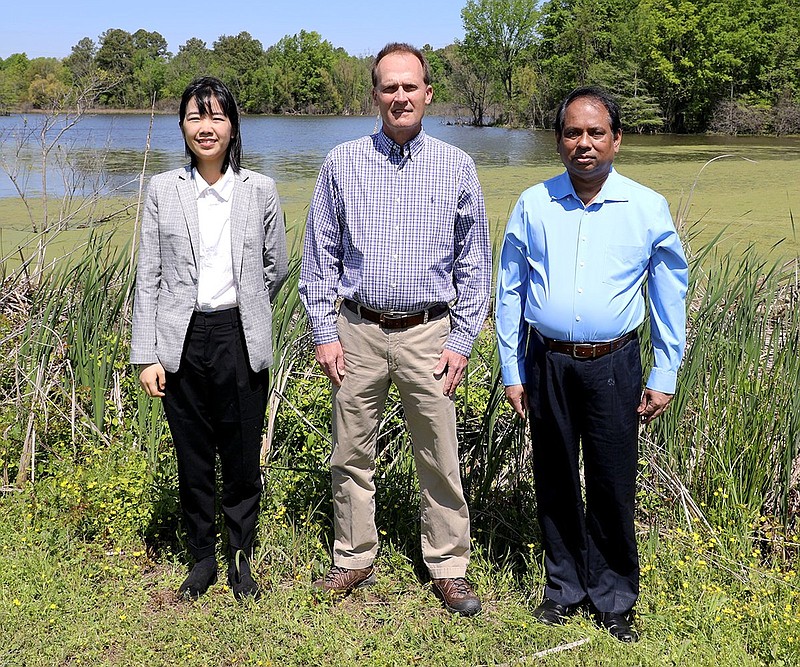The U.S. Department of Agriculture Natural Resources Conservation Service awarded a $3 million grant to the University of Arkansas at Pine Bluff’s Aquaculture/Fisheries Department, according to UAPB Chancellor Laurence B. Alexander.
“We are thrilled to announce that UAPB was chosen to receive a major grant to conduct nationally significant conservation research in partnership with NRCS,” Alexander said. “I would like to commend Dr. Michael Eggleton and his team for their contributions in leading the monitoring and assessment research that will result in a national framework for improving the wetlands.” Eggleton is a professor of fisheries science in the UAPB Aquaculture/Fisheries Department and is principal investigator for the grant. Co-principal investigators include Uttam Deb, assistant professor/aquaculture economics; Yingkai Fang, assistant professor/ natural resources economics; and Jonathan Spurgeon, assistant unit leader, U.S. Geological Survey - Nebraska Cooperative Fish and Wildlife Research Unit (formerly assistant professor/habitat management at UAPB).
The duration of the grant is 2021 through 2026.
“The purpose of the grant is to provide a formal evaluation of the NRCS’s Agricultural Conservation Easement Program – Wetland Reserve Easements (ACEP-WRE) program,” Eggleton said. “Until recently, the program was called the Wetlands Reserve Program (WRP).” The ACEP-WRE program funded by the Natural Resources Conservation Service allows landowners to cost-share with the conservation service in converting their marginal or retired farmlands back to native wetland and associated habitats, Eggleton said. The UAPB grant will concentrate on the ACEP-WRE program, which emphasizes wetlands.
“Since 1995, NRCS has enrolled more than 14,000 easements under the ACEP-WRE program, totaling more than 2.7 million acres nationally,” he said. “However, there has been little attempt historically to formally assess or evaluate the ACEP-WRE program. It is important to quantify how much environmental or ecological improvement the wetlands actually provide as well as how much economic benefit the program provides to landowners and society.” The 2018 farm bill recommends that the Natural Resources Conservation Service “… prioritize the maintenance and enhancement of the functions and values associated with its wetland easements.” As such, the Farm Production and Conservation Business Center of the conservation service requested UAPB and its partners to develop an ecological monitoring and assessment framework for the ACEP-WRE program, Eggleton said.
“Additionally, NRCS wants UAPB to quantify the associated costs of implementing such a framework for the whole program,” he said. “In short, evaluating restoration outcomes is important such that NRCS can be sure their program funding is being used effectively towards impactful wetland restoration.” During the first 12-18 months of the five-year project, UAPB will mine as much existing data as possible from databases and summarize that data at a national scale, Eggleton said.
“This summary will paint a picture of what we’re dealing with nationally with respect to these wetlands and this program,” he said. “This analysis will then help guide the direction of the second portion of the project, years two through four, where we are out in the field actually collecting data under a study design and analyzing it as needed.” The field work will be composed of a series of designed field experiments conducted by a variety of groups such as other universities, nongovernmental organizations and possibly some government agencies, he said. Year five will be the main year of tying it all together into a large report and disseminating the findings.
According to Andrew James, stewardship biologist for the conservation service’s National Easement Program Stewardship in Washington, D.C., decades of research have demonstrated the ecological and financial benefits that ACEP-WRE restoration projects provide for wildlife habitat, individual landowners and society at large at both local and regional scales.
“We are very excited about our new research project with UAPB because little work has been done that quantifies the overall benefits ACEP-WRE provides across the country,” James said. “We are confident the results of this research will reflect the quality of our wetland restoration and demonstrate the vital role that ACEP-WRE plays in meeting our nation’s wetland conservation goals.” Debbie Archer is an Extension associate-communications with the UAPB School of Agriculture, Fisheries and Human Sciences.
